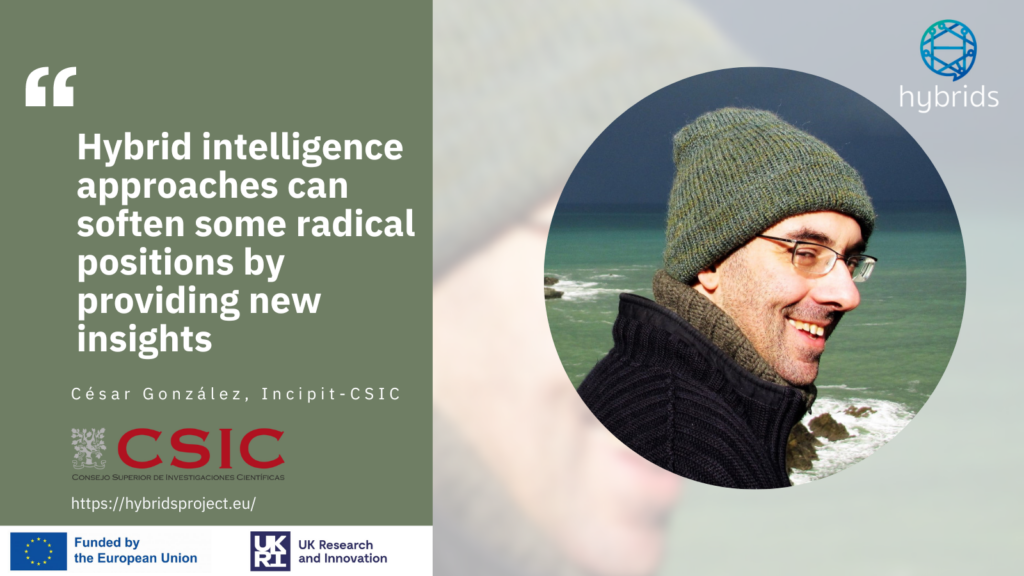By Maria Campins, Newtral
Artificial Intelligence and human knowledge seal a strategic alliance against disinformation along the research project HYBRIDS, the acronym of Hybrid Intelligence to monitor, promote and analyse transformations in good democracy practices. César González is the representative of one of the 14 partner organizations that will collaborate in the following years to promote different approaches on the basis of an exhaustive analysis of public discourse about crucial global issues, such as health, climate crisis, European skepticism or immigration, which will take into account both traditional media and content published through social networks.
González is a researcher in Semantic Technologies and Cultural Heritage at the Institute of Heritage Sciences (Incipit) at the Spanish National Research Council (CSIC). He leads a co-research line on software engineering and cultural heritage. His ultimate goal is to develop the theories, methodologies, and technologies that help us to understand how knowledge is created and communicated in relation to cultural heritage. González’s specialties are the modeling of complex information systems, the semantics of cultural heritage, situational method engineering, and transdisciplinary knowledge and technology transfer.
Why is it important to increase knowledge and investigation in hybrid intelligence?
Hybrid intelligence is about the combination of manual, human-made analysis, with automated, computer-generated results. Manual analysis carried out by humans is extremely powerful, and can produce insights that no computer can do and probably will be able to do for a long time. However, manual analysis is time-consuming, prone to error, and therefore very expensive.
Analysis carried out by computers, on the other hand, is much more affordable and fast. However, computers cannot understand and interpret a text as humans can, so they are limited to certain areas of analysis. By combining both types of analysis into a “hybrid intelligence”, we can leverage the best of both worlds: we can be fast and affordable in our work, but without losing the uniquely human intuitions and perceptions.
How do social sciences and computer science converge in the academic field?
For the last few years, we have heard a lot about the “digital humanities”, and although there is a lot of hype to this, it is true that computing is starting to become mainstream in many fields of the humanities and social sciences. Humanistic and social fields of research are transitioning from being individualistic, purely qualitative, and often very subjective domains of inquiry to incorporating teamwork, multidisciplinarity, and quantitative methods as part of their wide range of methods.
This, in turn, has opened the door to the application of computers and computer science to these fields. However, it is not easy. The humanities and social sciences often rely on critical approaches that are far removed from the hypothetico-deductive methods of natural sciences, which make both worlds quite alien to each other.
Fruitful conversations, not to mention collaborations, between humanists and software engineers, for example, are scarce and require hard work from both sides. Also, the fact that the traditional way to organise research across the world in “arts” vs. “sciences” means that universities, funding institutions and other organisations need to sort out additional barriers to the successful convergence of social and humanistic fields and computer science.
Why is this research important to fight polarization?
I understand polarisation as a process by which people’s opinions migrate from nuanced and compromising positions towards more radical, absolute and uncompromising ones. Polarisation is a complex social phenomenon that cannot be properly explained, not to mention counterbalanced, through single factors or actions. Having said this, it is very likely that hybrid approaches can soften some radical positions by providing new insights that are wide, thanks to massive data processing by computers, and deep, thanks to human involvement.
Which questions do you want to solve through the Ph.D. student assigned?
We have been working in argumentation theory and pragmatics for some time now, focussing on a combined ontological and argumentative approach that allows us to explore how people change their minds as a response to listening to arguments made by others.
With this Ph.D., I would like to further our research in precisely this field. I would like to characterise the phenomenon of ‘change of mind’, not only as a result of persuasion but also as a consequence of the diachronic revision of beliefs based on new evidence.
What do you aim to achieve with HYBRIDS?
Our strength in the project is on the side of manual, human-driven analysis, so we have two main goals in the project. On the one hand, we would like to become more familiar with computer-oriented techniques, especially in terms of how they can be used to assist human analysis. One particular area where this would be extremely valuable would be the reconstruction of propositions (that is, statements made by speakers) from texts. This is a fully manual task that requires a lot of time from experienced analysis, so any kind of computer assistance would be useful.
On the other hand, we would like to advance in manual techniques themselves. Specifically, we would like to validate and improve some proposals that we have developed for the combined analysis of ontology (what a speaker refers to) and argumentation (how they justify what they say).

